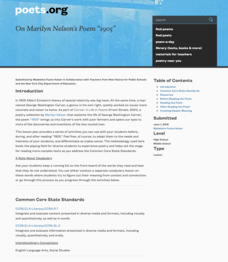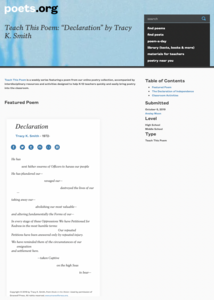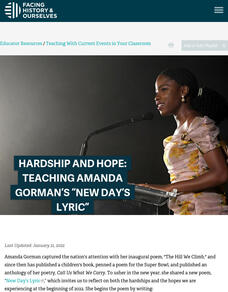Anti-Defamation League
10 Ideas for Teaching Black History Month
Celebrate Black History Month with the help of 10 ideas that delve deep into the history, major events, contributions, famous African Americans, and sheds light on how scholars today can take a proactive stance on current civil rights...
Education World
Black History Month Rap
Young scholars write a rap or hip-hop lyric about the life of a famous Black American. They explore famous Black Americans in history and explore how the rap form compares to other forms of poetic expression.
Academy of American Poets
Teach This Poem: “Making History” by Marilyn Nelson
What makes an event newsworthy, worth a reference in a news magazine or textbook? Who decides? These are questions Marilyn Nelson asks readers of her poem "Making History" to consider. To begin, class members list details they notice in...
Academy of American Poets
On Marilyn Nelson's Poem “1905”
Marilyn Nelson's poem, "1905," asks young scholars to compare and contrast George Washington Carver and Albert Einstein. After studying images of the two scientists and listing their observations, class members listen to several readings...
Academy of American Poets
Teach This Poem: “Declaration” by Tracy K. Smith
Tracy K. Smith's erasure poem "Declaration" challenges scholars to use their noticing skills to make connections between an engraving entitled "The Declaration of Independence" and Smith's poem. Class members record observations and...
Center for Civic Education
The Power of Nonviolence: The Children's March
What was the Children's Crusade and how did it impact the civil rights movement in the United States? Your young learners will learn about this incredible event through a variety of instructional activities, from reading a poem and...
Academy of American Poets
Teach This Poem: "Imagine" by Kamilah Aisha Moon
A lesson about Kamilah Aisha Moon's poem "Imagine" asks young scholars to imagine, "What would happen if...?" If Dr. Martin Luther King's dream became a reality. If Renisha McBride was a white girl and crashed her car in a black...
Academy of American Poets
Teach This Poem: "Old South Meeting House" by January Gill O'Neil
The vaulted ceiling of the Old South Meeting House has heard many voices. Young scholars read an excerpt about its importance in American history and then do a close reading January Gill O'Neil's poem, "Old South Meeting House." After...
Academy of American Poets
Teach This Poem: "A Place in the Country" by Toi Derricotte
Build young scholars' confidence in analyzing art and poetry with a lesson plan that first asks pupils to list details they notice in Edouard Vuillard's painting "Garden at Vaucresson" and then to describe how the painting makes them...
Academy of American Poets
Teach This Poem: "A New National Anthem" by Ada Limón
Ada Limon's poem, "A New National Anthem," offers young scholars an opportunity to reflect on the significance of the US national anthem and the extent to which Key's vision applies to all Americans. After watching a video of Whitney...
Crafting Freedom
George Moses Horton: Crafting Virtual Freedom Through Poetry
What is "virtual freedom"? How about "enslaved entrepreneurship"? Class members will learn about these terms and much more as they read the poems and examine the life of George Moses Horton.
Crafting Freedom
George Moses Horton: Slavery from a Poet's Perspective
After reading about the life of George Moses Horton, the first slave to publish anti-slavery poetry, learners will recall his major accomplishments, provide a summary of the obstacles he faced, and identify common aspects of the...
Learning for Justice
Maya Angelou
Maya Angelou's poem, "Still I Rise", offers young scholars an opportunity to consider how poets use literary devices to create powerful messages. After a close reading and discussion of the poem, class members reflect on how they can...
Academy of American Poets
The African American Experience
Disrespect can be as subtle as a frown or a turn of a head. To prepare for a study of Toi Derricote's poem "The Weakness" class members create wordless skits that demonstrate subtle or not so subtle signs of disrespect. After a...
Academy of American Poets
Teach This Poem: "When Fannie Lou Hamer Said" by Mahogany L. Browne
After watching an excerpt from a video of Fannie Lou Hamer's testimony before Congress, pupils do a close reading of Mahogany L. Browne's poem "When Fannie Lou Hamer Said," annotate words and phrases that draw their attention and list...
Academy of American Poets
Teach This Poem: "On Being Brought from Africa to America" by Phillis Wheatley
Phillis Wheatley's poem, "On Being Brought from Africa to America" is the focus of a lesson that asks readers to consider how the poem is a critique of slavery. Groups comprise a list of words and phrases they notice as well as questions...
Center for History Education
Speaking Up and Speaking Out: Exploring the Lives of Black Women During the 19th Century
Young historians investigate the often-hidden history of free and enslaved African American women before the Civil War. Using a collection of primary and secondary sources, including speeches, diaries, and poems, they evaluate the often...
National Gallery of Art
The First African American Regiment
Young historians examine a memorial sculpture of the first African American regiment in the Civil War, and then compare how the experiences of the regiment are portrayed in letters and poetry, as well as in the motion picture, Glory.
Crafting Freedom
F.E.W. Harper: Uplifted from the Shadows
What is stereotyping, and how do we handle stereotyping in our daily interactions? Your young historians will not only have the opportunity to learn about the first African American woman to publish a short story–Frances Ellen...
Crafting Freedom
F.E.W. Harper: Uplifted from the Shadows
Young historians discover the life of an incredible African American woman who, as an anti-slavery lecturer prior to the Civil War, defied stereotypes of what women could accomplish. Pupils explore the concept of stereotyping, read...
Crafting Freedom
George Moses Horton: Slavery from a Poet's Perspective
Pupils have the unique opportunity to learn about the institution of slavery by reading first-hand experiences as described by George Moses Horton, the first slave to publish anti-slavery poetry.
Facing History and Ourselves
Hardship and Hope: Teaching Amanda Gorman's "New Day's Lyric"
Class members come together to study Amanda Gorman's poem "New Day's Lyric." After a close reading of the poem, learners watch a video of Gorman reading her poem, and then craft additional lines for the poem where they offer suggestions...
National Endowment for the Humanities
Jacob Lawrence's Migration Series: Removing the Mask
Describe, analyze, compare and contrast poets from the Harlem Renaissance. Critical thinkers analyze the imagery, characterization, tone, symbolism, and historical context of Jacob Lawrence, Helene Johnson, and Paul Laurence Dunbar. A...
Crafting Freedom
Frances Ellen Watkins Harper: Lover of Literacy
This, the sixth in a series of 10 related resources, examines the life and works of Frances Ellen Watkins Harper, an African American author, born in 1825, who advocated literacy for both free and enslaved African Americans.

























